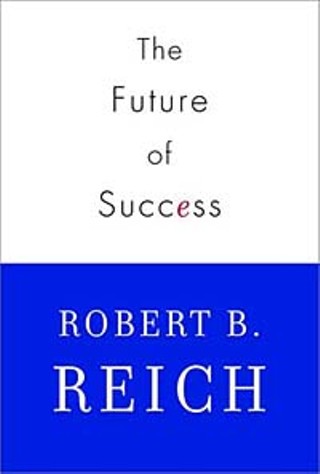Making a Living, Making a Life
Robert Reich Thinks We Should Consider the Difference
By Clay Smith, Fri., Feb. 2, 2001

Judging from the coverage he has been receiving, the most popular story trailing Robert Reich as he travels around the nation talking about his new book The Future of Success (Knopf, $26) is an entirely personal one. When Reich (pronounced Reish) was the secretary of labor in the Clinton administration, he was working late one night, so he called his family to tell them goodnight. His younger son Sam asked his father to wake him up when he got home. Reich replied that he would be home far too late to wake anyone up, but Sam insisted. Reich asked him why. "He just wanted to know that I was there, at home," Reich recalls, and when his son put it that way, Reich knew that he would have to resign from a job that he loved in order to spend more time with his family. Reich's experience should be popular because of our need to humanize powerful people, to know that they are thrown cumbersome dilemmas in just the same inauspicious way that cumbersome dilemmas are thrown to the rest of us. But Reich is responsible for the story's enduring grip: There's an obvious and heavy moral lesson here, but Reich refuses to beat his readers over the head with it. The Future of Success is nothing if not a frank discussion about the deep difficulty of "choosing" between work and our lives outside of work (there's a passage in which Reich confesses that while attending his other son's cross country meet, he counted up the "lost opportunity" dollars he could have made if he were at work). Reich explains why, if we are blessed by innovation, we are plagued by economic insecurity, and why, if the new economy is so successful, we all seem to be working so much harder.
There are other stories about Reich -- the respected intellectual who is also a brilliant popularizer on a mission to cogently explain labyrinthine economic policies to people who would rather die than read an economics text. He must have felt like the lone liberal in an administration that swayed increasingly to the right, an administration helmed by a man whom Reich met while they were both Rhodes Scholars (they reportedly met when Reich was seasick on the voyage to England and Clinton made his way into Reich's cabin with chicken soup, promising that "chicken soup will cure anything"). Since The Future of Success is ultimately about how we use our time, I asked Reich if he would mind talking about what a typical day was like when he was secretary of labor.
Robert Reich: Sure, I would get up at around 5:30 in the morning and get out the door around 6:30, get to the office at 7, go through the high priority items, have a meeting at 8 o'clock with the senior staff, another meeting at 9 o'clock with the department assistant secretaries, usually at that point I had to, maybe about 10:30 to 11:30 or 12, I had to go over to the White House or up to the Hill for either congressional hearings or for working with the president, or some sub-Cabinet group on something. Then I gobbled down lunch while I was in the car -- I usually didn't have separate meals. In the early afternoon, I spent time either on the phone with regional enforcement offices of the Labor Department, and that usually lasted about an hour, an hour and a half, then I had meetings with people in the department who were working on immediate problems or projects that needed my attention; that usually lasted until about 3:30 or 4. Often, in the late afternoon, I did some press. Early in the evening, I had to head back to the Hill -- it was back if I'd been there before -- but often it was to meet with individual senators and individual members of Congress about particular pieces of legislation bearing upon the Labor Department's work. And that brought us up to about 6, 6:30. Then I had to head out to a series of meetings with various constituency groups who were interested in Labor Department work; they may be one day a group of black ministers, another day a group of people working on poverty policy, another day it might be a labor union leader and his union top brass, another day it might be meeting with some people who were particularly interested in education and training problems or issues, and then after that, I would often give a speech to a group that was in town or attend receptions put on by Congress or the White House, and those speeches, it was usually more than one an evening. Usually one in the early evening, one in the later evening, and then I would get home about 9 or 9:30, possibly 10 o'clock, and then I'd have two hours of reading material in order to get ready for the next day. Now that was a day when I was in Washington. You have to understand that at least one day a week, I was out in the country visiting various cities and the work that I did not get done on a day I was out of Washington usually had to be made up when I came back.
AC: A lot of intellectuals don't really seem to enjoy thinking about or writing about the workplace and management, but you do. Why is it interesting to you?
RR: That's where we live, and that's our lives. Most Americans spend most of their lives at work. And whether people have good work or bad work or work too long or don't have enough work, it colors the rest of their lives. I've been looking at these issues for many years and then as secretary of labor, I obviously had a chance to do something about it.
AC: You're saying in The Future of Success that balancing work with life outside of work is harder now than it used to be. Why is that?
RR: Three reasons. First, the new economy makes earnings unpredictable, so that there are more and more of us who cannot be sure of what we're going to earn next year or even next month. We're either free agents or freelancers or maybe we're working as franchisees or we are billing somebody on the basis of billable hours or we're being paid for our performance or we're getting commissions. Whatever it is, a larger and growing portion of us feel that we've got to make hay while the sun shines.

The second reason is that because customers can so easily leave us for a better deal, or leave our organization ... almost every business is much more competitive than it was before, and clients and customers and consumers can leave us much, much more easily for a better deal. And that means all of us have to hustle harder, to hold every client and to hold every customer, every consumer, and that means that we don't have a choice, there's no cruising altitude.
And then the third reason is that with widening inequality of income, if you are in the bottom third, you have to work harder just to make ends meet. If you're in the top third, you can make more money than ever before, so there's a bigger sacrifice that goes with deciding not to work. So for all these reasons, we are working harder. The average middle income family with children is working seven weeks more this year if you add up all of the hours that both -- and it's usually two -- earners are putting in, than they worked in 1990. Even though the economy is so much better.
AC: In your book, you refer to geeks and shrinks. Why are geeks -- the "creative people" -- and shrinks, who are able to intuit what consumers want, so vital?
RR: Because in the new economy (and it's spreading by the way, it's not just technology, it's spreading everywhere), innovation is the key to competitive survival, not economies of scale. It's not just making more and more of the same thing. Your competitors now are trying to produce something better and/or something cheaper and/or something faster, and unless you innovate as well, you're in danger of losing the race. Geeks and shrinks as I describe them are the people who know how to innovate, they're closest to the technology, or the content, and they're also closest to the market.
AC: Are public policy professors geeks or shrinks?
RR: We're geeks. Absolute geeks. When I was in government, though, I was more of a shrink. That is, I had to be sensitive to politics, to where people were. I had to respond to what it was the public was thinking and wanting. I had to put my policy wonk hat in the closet, and I had to become much more of a somebody who is engaged continuously in interpersonal dialogue.
AC: Could you tell me about your French designer hips and why they're important in this context?
RR: Well, because of a genetic problem, which I didn't really know about until my 30s, my hips were deteriorating and I had to have new hips put in. Both of them are new, artificial, and I guess you're referring to my discovery about where they're made, is that right?
AC: Right.
RR: Because I discovered that my new hips -- not long ago I was talking about globalization, a couple of years ago, I guess -- and I decided to find out where my hips were made, and I found out that my new hips were actually fabricated in Germany, and they were designed in France, which suggests that globalization is not a matter of our companies vs. their companies. Almost every product today is a composite, even me. Even I am a composite. ![]()
Robert Reich will be at BookPeople on Friday, Feb. 2, from 5-6pm.








